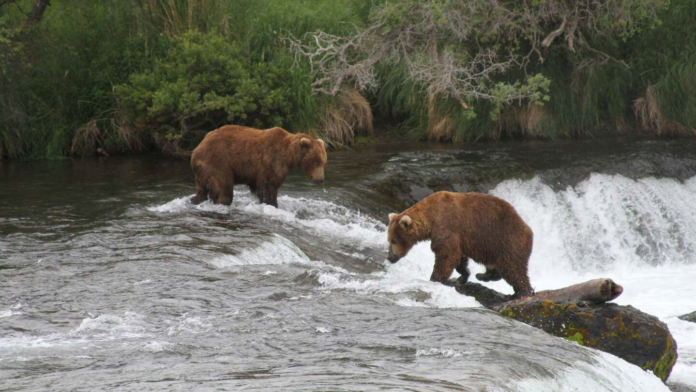JUNEAU, Alaska (AP) — Conservation groups sued Monday over a state program in Alaska that authorizes killing brown bears and black bears as a way to increase the size of a once-significant caribou herd in the southwest part of the state. The groups allege the program lacks a scientific basis and is unconstitutional.
The lawsuit filed in state court says the program adopted by the Alaska Board of Game in July doesn’t require the Department of Fish and Game to monitor bear populations to ensure their numbers remain sustainable. It also says the program — carried out by department employees and allowing them to shoot from helicopters — sets no limits on how many bears can be killed in an area that’s roughly the size of Indiana.
Filed by Trustees for Alaska on behalf of the Alaska Wildlife Alliance and the Center for Biological Diversity, the lawsuit lists as defendants the state, the board, the Department of Fish and Game and the department’s commissioner. A message seeking comment was sent to the Alaska Department of Law, which typically represents state agencies in litigation.
Monday’s lawsuit is the latest in an ongoing legal fight over what Fish and Game has cast as an effort to restore the Mulchatna caribou herd. The herd, named for its traditional calving ground, peaked in number at around 190,000 in the late 1990s and had provided an important source of food for subsistence hunters from dozens of communities. But the herd’s numbers began falling, down to about 13,000 caribou by 2019, and hunting has not been allowed since 2021, according to the department.
The department has said that factors such as disease, hunting, food availability and quality, and predation can affect caribou survival, and in this case, the board determined it could address predation. It said it’s responding to requests to help rebuild the herd and restore the caribou as a food source for the region.
In a fall newsletter, the department said bears and wolves “have been identified as significant calf predators.” It said an aerial survey last fall indicated the ratio of calves to cows in the herd’s western subgroup was the highest recorded since 1999. It said this suggested a “positive response” to its 2023 and 2024 predator control program targeting bears and wolves on calving grounds.
According to the lawsuit, in May 2023 the agency killed “every single brown and black bear it found within the 1,200-square-mile (3,108-square-kilometer) focus area encompassing the western Mulchatna caribou herd calving grounds.” Altogether, in 2023 and 2024, 180 bears, most brown bears, were killed, the lawsuit says.
The Alaska Wildlife Alliance previously sued to end the program. In that case, a judge in March found fault with the process in which it was adopted and concluded the state lacked data on bear sustainability in the region before implementing the program.
But the board and department pushed ahead, implementing emergency regulations under which 11 bears were killed before those were struck down by another judge.
The department later announced a public comment process surrounding plans to reauthorize the program, which Monday’s lawsuit said incorporates elements that were struck down in the March ruling. The plan adopted by the board in July authorizes the program to continue through 2028, the lawsuit says.
“We were trying to rebuild the caribou herd, but we’re not going to jeopardize long-term sustainability of bears in so doing,” the department’s commissioner, Doug Vincent-Lang, said in a statement after the board’s action.
He said there was “strong evidence that neither disease nor nutrition are preventing this herd from recovering,” and that predation “has been isolated as the limiting factor preventing the herd from growing.”
Nicole Schmitt, executive director of the Alaska Wildlife Alliance, said the program “threatens bears who move across vast stretches of public lands.”
Schmitt in a statement Monday said sections of the area in which bears can be killed are near Lake Clark National Park and Preserve, about 30 miles (48 kilometers) from Katmai National Park and Preserve and near wildlife refuges.
Michelle Sinnott, staff attorney with Trustees for Alaska, called the program unconstitutional. She said it “hands Fish and Game a blank check to destroy bears across an entire region with impunity. The Board of Game has once again shirked its constitutional obligations and ignored prior court decisions in its unscientific and relentless war on predator animals.”




